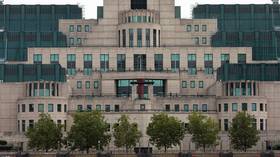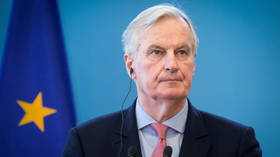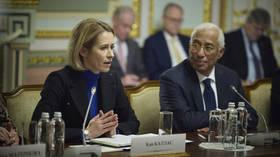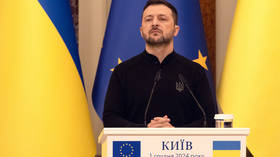Why the US sent the CIA chief to handle Israel-Hamas negotiations

US President Joe Biden has deployed overseas his CIA Director William Burns, who served as secretary of state and deputy secretary of state under President Barack Obama, to try and broker a deal between Israel and Hamas.
Details of what exactly Burns discussed with high-level diplomatic and intelligence officials from Egypt, Qatar, and Israel are unknown at this time. It is reported, however, that Israel’s latest proposal would see a 60-day pause in combat in return for the staggered release of more than 100 captives still held by Hamas, with women and children first, then civilian men, military members, and the remains of hostages who died in captivity.
While, indeed, the CIA chief’s met with peers from the intelligence community, his attendance displays something that reflects poorly on the state of US diplomacy, and implies a lack of savoir faire at the State Department.
It should be noted that the US government has many different offices, bureaus, and departments that compete against one another for funding and clout. For decades, the CIA and the State Department had tried to stay apart. It has been noted, for example, by CIA founding member Miles Copeland Jr. that the State Department was originally averse to some of its covert activities, such as agents using diplomatic credentials as cover. During the Cold War, Copeland said, the State Department not only refused to take part in CIA activities but did not even want to be informed about them, as in the case of the coup d’etat in Syria in the 1960s.
In modern times there has been a convergence between these two agencies, and others, too, which reflects the priorities of successive administrations. Under President George W. Bush, Colin Powell, a military man, became the first Secretary of State to serve on the Joint Chiefs of Staff while in that role. This showed that Powell, Washington’s head diplomat, was to be intimately involved in the American war effort in Iraq and Afghanistan.
During the administration of former President Donald Trump, he promoted Mike Pompeo from CIA director to Secretary of State. The Trump administration’s foreign policy style thus shifted to a much more aggressive and subversive approach, emulating how the CIA conducts its business. This was particularly aimed at undermining the resurgence of China, as well as ratcheting up tensions with Russia.
In contrast, President Joe Biden enlisted William Burns, a long-time diplomat, as his CIA director. According to Colonel Lawrence Wilkerson, Colin Powell’s former chief of staff, this pick was because of Burns’ reliability, experience, and honesty – traits becoming of a diplomat. Biden apparently did not want someone who’d gained their professional experience from the CIA to head the spy agency, probably because such people are prone to what Pompeo described as lying, cheating, and stealing.
The fact that the director of the CIA is getting so intimately involved in negotiations between Israel and Hamas, having already been a part of the November agreement that led to the release of Palestinian and Israeli hostages and to a week-long ceasefire, may perhaps be worrying. It could be interpreted that the US is not actually interested in real diplomacy but rather in trying to threaten Hamas leaders into surrendering on behalf of West Jerusalem.
While that may indeed be the case, since the Israeli government is committed to a total military victory in Gaza and the Biden administration is backing West Jerusalem almost unconditionally, it says more about the fact that the State Department lacks the requisite leadership and know-how to handle this situation.
As Burns has been managing negotiations between Israel and Hamas, Secretary of State Antony Blinken wrapped up a West Africa trip that analysts believe was an attempt by Washington to shore up transatlantic trade in light of instability in the Middle East. He also stuck to the same tired script with regard to China, invoking ‘debt-trap diplomacy’ and unfair labor and trade practices. Meanwhile, protesters sat outside Blinken’s Arlington, Virginia home demanding a ceasefire in Gaza – apparently unaware that he’s not even the one leading diplomatic efforts currently.
A lack of leadership on behalf of Blinken at this defining moment in the conflict in Gaza, as American soldiers die in the Middle East and international trade is threatened by Houthi attacks on ships that use the Suez Canal, is apparent. The fact that the CIA has had to step in at this juncture demonstrates the sorry state of US diplomacy, underscoring the gradual but inevitable decline of American soft power.
The statements, views and opinions expressed in this column are solely those of the author and do not necessarily represent those of RT.















